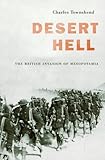Desert Hell : The British Invasion of Mesopotamia / Charles Townshend.
Material type: TextPublisher: Cambridge, MA : Harvard University Press, [2011]Copyright date: ©2011Description: 1 online resource (623 p.) : 16 halftones, 3 mapsContent type:
TextPublisher: Cambridge, MA : Harvard University Press, [2011]Copyright date: ©2011Description: 1 online resource (623 p.) : 16 halftones, 3 mapsContent type: - 9780674061347
- 940.4 23 22
- D568.5 .T68 2011eb
- online - DeGruyter
| Item type | Current library | Call number | URL | Status | Notes | Barcode | |
|---|---|---|---|---|---|---|---|
 eBook
eBook
|
Biblioteca "Angelicum" Pont. Univ. S.Tommaso d'Aquino Nuvola online | online - DeGruyter (Browse shelf(Opens below)) | Online access | Not for loan (Accesso limitato) | Accesso per gli utenti autorizzati / Access for authorized users | (dgr)9780674061347 |
Frontmatter -- Contents -- Plates -- Abbreviations -- Author’s Note -- Maps -- Introduction -- I: Basra -- 1. Into Mesopotamia -- 2. ‘An unexpected stroke’ -- 3. Turks and Indians -- 4. Basra -- 5. ‘Conciliating the Arabs’ -- 6. Qurna -- 7. ‘Morally responsible to humanity and to civilization’ -- 8. ‘One of the decisive battles of the world’ -- 9. Townshend’s Regatta -- 10. Up the Euphrates -- 11. To Kut -- II: KUT -- 1. To Baghdad? -- 2. To Salman Pak -- 3. Ctesiphon -- 4. Retreat -- 5. Under Siege -- 6. To the Rescue -- 7. Marking Time -- 8. Flood and Famine -- 9. Dujaila: The Second Battle for Kut -- 10. Failure -- 11. Surrender -- III: Baghdad -- 1. Policy Paralysed: Egypt v India -- 2. Administration and Punishment -- 3. Retooling the Army -- 4. Captivity -- 5. Inquiry -- 6. Maude’s Offensive: The Third Battle for Kut -- 7. Baghdad at Last -- 8. Maude’s Moment -- IV: MOSUL -- 1. Northern Exposure -- 2. Maude’s End -- 3. Strengthening the Hold -- 4. Caucasian Fantasies -- 5. Victory -- 6. Self-Determination? -- 7. Retrenchment -- 8. Rebellion -- 9. Kingdom Come -- 10. Kurdistan for the Kurds? -- 11. The World Decides -- Afterword -- Notes -- Bibliography -- Index
restricted access online access with authorization star
http://purl.org/coar/access_right/c_16ec
The U.S.-led conquest and occupation of Iraq have kept that troubled country in international headlines since 2003. For America’s major Coalition ally, Great Britain, however, this latest incursion into the region played out against the dramatic backdrop of imperial history: Britain’s fateful invasion of Mesopotamia in 1914 and the creation of a new nation from the shards of war. The objectives of the expedition sent by the British Government of India were primarily strategic: to protect the Raj, impress Britain’s military power upon Arabs chafing under Ottoman rule, and secure the Persian oil supply. But over the course of the Mesopotamian campaign, these goals expanded, and by the end of World War I Britain was committed to controlling the entire region from Suez to India. The conquest of Mesopotamia and the creation of Iraq were the central acts in this boldly opportunistic bid for supremacy. Charles Townshend provides a compelling account of the atrocious, unnecessary suffering inflicted on the expedition’s mostly Indian troops, which set the pattern for Britain’s follow-up campaigns in Iraq and Afghanistan over the next seven years. He chronicles the overconfidence, incompetence, and dangerously vague policy that distorted the mission, and examines the steps by which an initially cautious strategic operation led to imperial expansion on a vast scale.Desert Hell is a cautionary tale for makers of national policy. And for those with an interest in imperial history, it raises searching questions about Britain’s quest for global power and the indelible consequences of those actions for the Middle East and the world.
Mode of access: Internet via World Wide Web.
In English.
Description based on online resource; title from PDF title page (publisher's Web site, viewed 03. Jan 2023)


